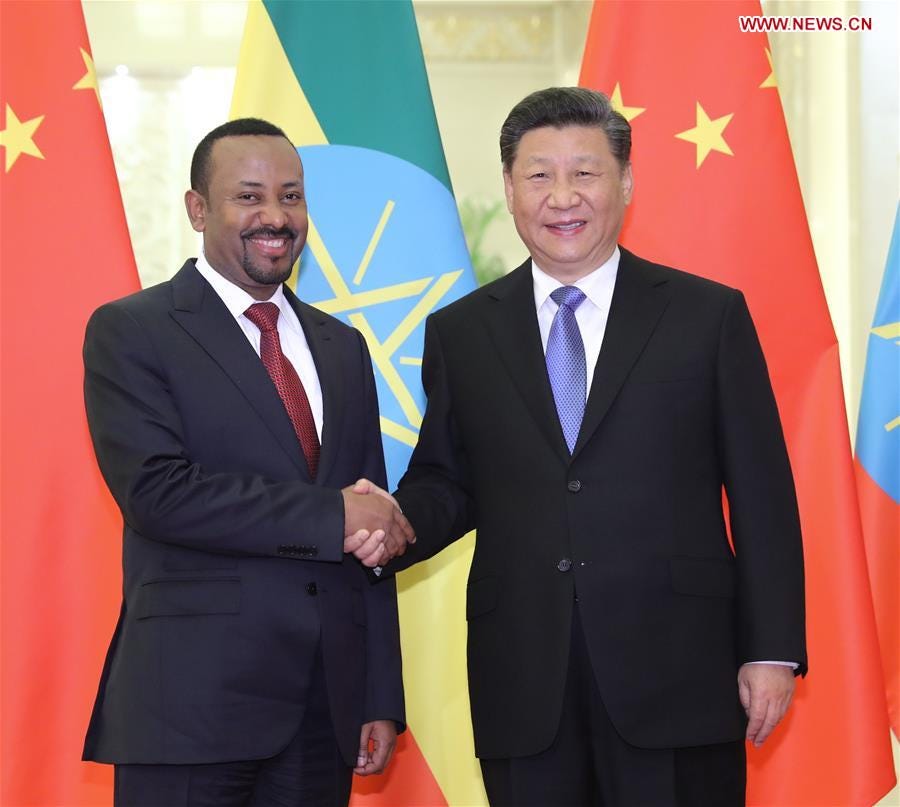China's Growing Influence in Ethiopia Challenges US and European Dominance
Ethiopia's China ties spark concern over growing influence.
Addis Ababa, Ethiopia - The Ethiopian government's acknowledgement of China as its leading source of foreign direct investment, largest trading partner, and development financier has sparked controversy and raised concerns about the growing influence of the People's Republic of China in the African nation.
China has been strategically strengthening its diplomatic engagement with the Horn of Africa region, aiming to solidify its foothold in the conflict-ridden area.
As the United States and its European allies, including France, have scaled back their involvement, China has been shifting the dynamics of its geopolitical influence in sub-Saharan Africa.
The Horn of Africa consists of six states, including Ethiopia, Eritrea, Sudan, Djibouti, Somalia, and the self-governing state of Somaliland.
China's expanding footprint in the region is raising eyebrows and prompting discussions about the potential consequences.
On Thursday, May 25, China announced its intention to enhance cooperation with African countries by providing additional emergency food aid to the Horn of Africa.
China's Foreign Minister, Qin Gang, stated in Beijing that the People's Republic of China would fund the reconstruction of Ethiopian infrastructure destroyed during the year-long Tigray War.
Critics argue that China has been utilising investment as part of its "debt-trap diplomacy," aiming to further its economic and military expansionism abroad.
In 2022, Beijing sponsored the inaugural Horn of Africa Peace, Good Governance, and Development Conference in Addis Ababa, presenting Ethiopia as a "model country" under its ambitious $126 billion Belt and Road initiative.
During a meeting between Ethiopian Deputy Prime Minister and Foreign Minister Demeke Mekonnen Hassen and Chinese FM Qin, China expressed its commitment to supporting Ethiopia's post-war reconstruction, development, and revitalization.
In return, China pledged to rehabilitate and rebuild Ethiopia's infrastructure, which suffered extensive damage during the conflict in the Tigray Region.
Ethiopia's acknowledgement of China as its leading source of foreign direct investment, largest trading partner, and development financier indicates the significant role China now plays in the African nation's future growth.
However, it remains unclear whether the two countries have reached an agreement on settling or restructuring Ethiopia's debt under the Group of 20's Common Framework.
China's expanded diplomatic efforts in Ethiopia came after the United States suspended aid to Mali, Ethiopia, and Guinea, citing alleged violations of the AGOA Statutes.
China criticised the US action as "meddling" in Ethiopia's internal affairs, further highlighting the contrasting approaches of the two global powers.
China's extensive development aid, massive infrastructure investments, and discussions about establishing a new military base in Africa have raised concerns among Western nations.
However, amidst China's rapid expansion, a tiny East African nation, Somaliland, is taking a different approach.
The foreign minister of the Somaliland Republic recently visited Taiwan, asserting that China cannot dictate with whom Somaliland chooses to have relations.
This move has faced condemnation from Beijing, as Somaliland resists China's advances through the Belt and Road initiative.
As China continues to increase its presence and influence in Africa, debates and controversies surrounding its intentions and impacts are expected to persist.
The dynamics of geopolitical power in the region are undergoing significant transformations, and Ethiopia's acknowledgement of China's leading role has only added fuel to the ongoing discussions.



